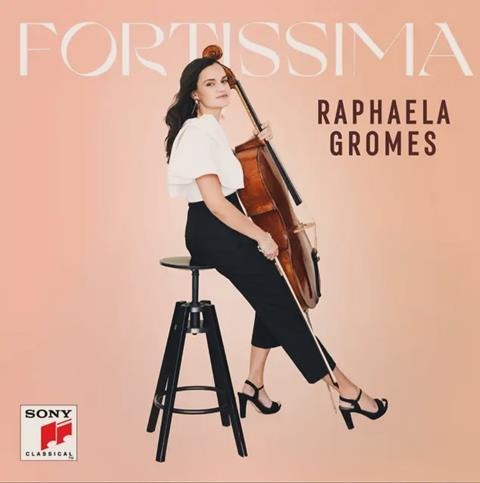search
date/time
 | North East Post A Voice of the Free Press |

Andrew Palmer
Group Editor
1:00 AM 1st November 2025
arts
Review
Classical Music: Fortissima Raphaela Gromes
Illuminating a hidden chapter in cello repertoire
CD 1: (feat. Julian Riem, piano) Henriëtte Bosmans Cello Sonata in A Minor;
Victoria Yagling Larghetto Emilie Mayer Cello Sonata in A Major; Mélanie Bonis Méditation; Luise Adolpha Le Beau Cello Sonata in D Major, op. 17; Adele: All I ask;
CD 2 (feat. Deutsches Symphonie-Orchester Berlin, conductor: Anna Rakitina)
Marie Jaëll Cello Concerto in F Major; Maria Herz Cello Concerto Op. 10; Elisabeth Kuyper Ballad for Cello and Orchestra, op. 11; Rebecca Dale Femmage I - She Walks Through History; Femmage II - Meditation for Cello & Orchestra P!NK: Wild Hearts Can't Be Broken
Raphaela Gromes (cello) Julian Riem (piano) Deutsches Symphonie-Orchester Berlin/Anna Rakitina
SONY CLASSICAL G010005505549R

"Fortissima is about role models, for everyone, but especially for young women," states Raphaela Gromes. "The stories of these artists are about personal integrity, the longing for freedom, and irrepressible creativity. It's not just about outstanding music but deeply inspiring personalities."
Highlights abound, including Luise Adolpha Le Beau's Cello Sonata. Both Emilie Mayer (born 1812) and Le Beau (born 1850) were fortunate enough to gain recognition as composers during their lifetimes. Mayer's works received performances at the Konzerthaus Berlin, including for King Friedrich III, though she was compelled to finance both performances and publications herself—possible only through an inheritance from her father. The Sonata in A major for Piano and Cello is one of ten surviving cello sonatas. Luise Adolpha Le Beau enjoyed early support as a pianist from her parents and received tuition from Clara Schumann. She became the first woman to study composition under Josef Rheinberger in Munich, first attracting attention for her compositions in 1882 with her Five Pieces for Violoncello, Op. 24. The chemistry between this duo of cellist and pianist is palpable throughout, their musical partnership bringing the chamber works alive with a conviction that proves utterly captivating.
Though Marie Jaëll was hailed as a musical prodigy and toured across Europe as a child piano virtuoso, a career as a composer largely eluded her. She received private tuition from César Franck and Camille Saint-Saëns and, as personal secretary to Franz Liszt, edited and completed several of his works. Here we encounter her sumptuous Cello Concerto in F major, dedicated to her late husband. One senses Jaëll's profound loss as portrayed so beautifully by Gromes. The low, expressive textures of the orchestra and soloist at the opening of the Lento (recreated by Julian Riem from sketches) prove deeply affecting, and Gromes' sympathetic interpretation is genuinely moving. This is a work that deserves far wider currency in the concert hall.
The adaptation of Adele's All I Ask pays tribute to one of our era's greatest soul voices and songwriters—the lilting, lyrical quality is utterly captivating, while P!NK's Wild Hearts Can't Be Broken holds special personal significance for Raphaela Gromes. The lyric, "My freedom is burning, this broken world keeps turning, I'll never surrender, there's nothing but a victory. This is my rally cry" could equally serve as a motto for the women composers featured on the album.
The passion and affection for all these works are conveyed with such conviction that understanding the stories behind the compositions adds immeasurably to one's appreciation of the performances.
Many of these early female composers were initially instrumentalists—a description that particularly applies to Victoria Yagling, a true star cellist according to the booklet notes. Born in 1946 in the Soviet Union, she studied with Rostropovich and triumphed in major competitions. Censorship in the USSR hindered her creative work, and only in 1990 could she emigrate to Finland, where she became a highly respected professor. Her Larghetto offers five exquisite minutes of cello and piano, its flowing, lyrical contours tugging powerfully at the heartstrings.
A significant discovery.
Also by Andrew Palmer...
The Lily Of Killarney – Clarinet Fantasias From England And IrelandClassical Music: Chamber Works by Ernest KanitzFine Dining - Etz: A Metamorphosis In The MakingPlaying To Win: How One Hotel Manager Transformed A Nuremberg Property Into The City's Most Enchanting StayClassical Music: Ralph Vaughan Williams Mantegna